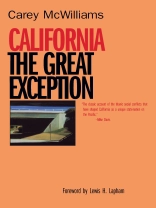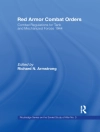In 1949, lawyer, historian, and journalist Carey Mc Williams stepped back to assess the state of California at the end of its first one hundred years—its history, population, politics, agriculture, and social concerns. As he examined the reasons for the prodigious growth and productivity that have characterized California since the Gold Rush, he praised the vitality of the new citizens who had come from all over the world to populate the state in a very short time. But he also made clear how brutally the new Californians dealt with ‘the Indian problem, ‘ the water problem, and the need for migrant labor to facilitate California’s massive and highly profitable agricultural industry. As we look back now on 150 years of statehood, it is particularly useful to place the events of the past fifty years in the context of Mc Williams’s assessment in California: The Great Exception. Lewis Lapham has written a new foreword for this edition.
Tabela de Conteúdo
FOREWORD BY LEWIS H. LAPHAM
CHAPTER I. ON UNDERSTANDING CALIFORNIA
CHAPTER II. CALIFORNIA-THERE SHE GOES!
1. Tipping the Scales
2. Change Is Cumulative
3· Westchester, the Water Baby
4· California’s Growing Pains
5. Planning by Indirection
CHAPTER III. THE MAGIC EQUATION
1. Poor Man’s Gold Rush
2. California: The Mining Entrepreneur
3· The Something for Nothing Business
4· The Lightning’s Bolt
CHAPTER IV. THE MUSTANG COLT
1. California: The Outsider
2. The Thirty-first Star
3· The Dignity of Labor
4· The Blanket without the Indian
5. The Flag of the Bear
6. The Precocious Frontier
7· Union-With a Difference
CHAPTER V. MIXED MULTITUDES
1. Gold Sets the Pattern
2. Like a Gourd in the Night
3· What Was Your Name in the States?
4· A Quilt of Many Colors
5· Old and Young in California
6. The Origin of Gallantry
7. A State of Cities
8. Population Whirligig
CHAPTER VI. CALIFORNIA LATIFUNDIA
1. Frontier without Homesteads
2. The Rape of the Public Domain
3. The Meaning of Land Monopoly
CHAPTER VII. THE MOSAIC OF CALIFORNIA’S
AGRICULTURE
1. Her Infinite Variety
2. America’s Natural Hothouse
3. The Meaning of Specialization
4. The World in Miniature
5. Challenge and Response
6. The Advantages of Organization
CHAPTER VIII. CALIFORNIA LABOR: TOTAL
ENGAGEMENT
1. No Affinity with Bondage
2. ‘The Magic Scepter’
3. The Economics of Extremism
4. Labor’s Curious Ducklings
5· The Pattern of Violence
CHAPTER IX. CALIFORNIA’S PECULIAR
INSTITUTION
I. The Grapes of Wrath Are Stored
2. The Labor Pool
3. The System of Control
4. The Plot Never Changes
5. Of the Valleys
CHAPTER X. PERILOUS REMEDIES FOR
PRESENT EVILS
I. Kearneyism in California
2. The Union Labor Party
3. Kearneyism Re-enacted
4. The Revolt of the Thirties
5. California’s Bloody Shirt
6. Homebred Knight-Errant
7. The Hidden Spring
CHAPTER XI. THE STATE THAT SWINGS
AND SWAYS
I. The Bulge in the Middle
2. The Guy Who Gets Things Done
3. Campaigns, Inc.
4. Sacramento: Commodity Market
CHAPTER XII. INDUSTRY: THE CULTURAL
APPROACH
I. The Momentum of an Early Start
2. The Edge of Novelty
3· Local Needs and New Markets
4. Bull of the West
CHAPTER XIII. THE FABULOUS BOOM
I. The Long-Term Trend
2. The Emergence of Western Steel
3· The Question of Power
4· The Price of Expansion
5. Technology and the West
CHAPTER XIV. LADDER TO THE STARS
I. Certain California Eccentrics
2. The Development of Mt. Wilson
3· Not the Moon
4· Science in an Orange Grove
5. Antennas on a Mountain Top
6. The Right Side of the Mountains
CHAPTER XV. THE ONE-LEGGED GIANT
I. Climate without Weather
2. The Drouth of I948
3· Geological Waters
4· The Intrusion of Salt
5. How Not to Conserve Water
6. The Outlying Coastal Districts
7. The Flood Paradoxical
8. Brush Fires and Burns
CHAPTER XVI. THE POLITICS OF THE
COLORADO
1. Menace or Resource?
2. Water Imperialism
3· Nature’s Freak: The Imperial Valley
4· The Over-Division of Water
CHAPTER XVII. THE CENTRAL VALLEY
PROJECT
1. California-Upside Down
2. Genesis of the Project
3. The Intrepid Colonel
4· Giant of Giants
5. The Irrelevant Cow Company
6. The Power Question
7. State vs. Federal Control
CHAPTER XVIII. 0 PANTHER OF THE SPLENDID HIDE!
1. The Problem of California
2. The End of Exceptionalism
3· Jack and Jill
4· California the Tiger
5. On Western Unity
6. The Future Is West
Sobre o autor
Carey Mc Williams (1905-1980), editor of The Nation from 1955 to 1975, also served as California Commissioner of Immigration and Housing for four years. He was the author of many books, including Factories in the Field, Ill Fares the Land, Brothers under the Skin, A Mask for Privilege, and Southern California: An Island on the Land. Lewis H. Lapham, a native San Franciscan, is the editor of Harper’s Magazine.












